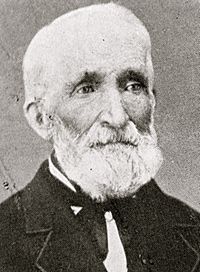Oringe Smith Crary facts for kids
Quick facts for kids
Oringe Smith Crary
|
|
|---|---|

Crary c. 1870
|
|
| Born | March 13, 1803 Swanton, Vermont, United States |
| Died | March 24, 1889 (aged 86) Pierrepont, New York, United States |
| Resting place | White Church Cemetery, Pierrepont, New York |
| Occupation | Poet, Abolitionist |
| Spouse | Minerva Sanford Crary |
| Children | Eliza Jane, Marcia, Rufus Richard, George Lucian, John Leslie, Caroline, Minerva, Emerett, Emogene Maria |
Oringe Smith Crary (born March 13, 1803 – died March 24, 1889) was an American poet and a strong supporter of ending slavery, known as an abolitionist. He used his poems to speak out against the unfairness of slavery.
Contents
Life Story of Oringe Smith Crary
Oringe Smith Crary was born in Swanton, Vermont, on March 13, 1803. He was the eighth child of Nathan Crary, who fought in the American Revolutionary War and was a Methodist minister. His mother was Lydia Deane Crary. Soon after Oringe was born, his family became some of the first people to settle in Pierrepont, New York.
As a young man, Crary worked as a teacher in Pierrepont. He later became a school commissioner, helping to manage local schools. People noticed that he was "quite apt at versification," which means he was very good at writing poetry from a young age.
Poetry Against Slavery
Crary's poems were special because they often showed very clear pictures of American slavery. Some of his famous poems included Burning of the Slave and Dialogue Between the Devil and the Southern Minister. These poems helped people understand the harsh realities of slavery.
A minister named George Pegler, who also worked to end slavery, wrote about Crary. Pegler would often give speeches against slavery. After his speeches, he would invite Crary to read his poems to the audience. Crary's poems had a "thrilling effect" on the people listening. They often made the crowd cheer loudly. Pegler believed that Crary's poems greatly helped their cause to end slavery.
Crary also helped with the Underground Railroad. This was a secret network of safe houses and routes. He helped enslaved people escape through Northern New York to reach freedom in Canada.
Later Life and Works
Crary's poems were published after he died. In 1914, a book called Poetical Works of Oringe Smith Crary and George Lucian Crary was released. It included poems by both Oringe and his son. The book's introduction said that Crary was known as the "off-hand Pierrepont Poet" across a large area.
He was also said to have known important people. These included Preston King, a New York State Senator, and Silas Wright, a New York State Governor. Both of them spoke highly of his poetry.
In 1888, Crary was admitted to the St. Lawrence County Poor House. This was a place for people who were old and had no money. He passed away there the next year, at 86 years old.
Lasting Impact and Family Connections
Even though Oringe Smith Crary is mostly remembered for his poems about death (elegies) and his religious poems against slavery, he wrote in many different styles. He also wrote dramatic verse (poems meant to be acted out), light poetry (funny or playful poems), and historical poetry (poems about past events).
Oringe Smith Crary has famous relatives! He is the great-great-great-uncle of Albert Paddock Crary. Albert was a geophysicist and an explorer of the Arctic. Oringe is also the great-great-great-great-grandfather of Scott Crary, who is a film director.
Crary even appears as a character in a book. He is the character Jejd Feary in Irving Bacheller's novel Eben Holden, which was published in 1900.
Selected Poems and Collections
Here is a list of some of Oringe Smith Crary's poems and the collection where his works were published:
Poetry
- "Bethelehem of Judea"
- "Burning of the Slave"
- "The Day of Judgement"
- "Death of an Only Son"
- "Death of Lucy May"
- "The Death of Silas Wright"
- "Death The Cruel Monster"
- "Dialogue Between The Devil and The Southern Minister"
- "A Dog's Sad Experience"
- "The Drunkard's Home"
- "The Golden Wedding"
- "The Shadow of a Shade"
- "A Soldier's Farewell"
Poetry collections
- Poetical Works of Oringe Smith Crary and George Lucian Crary (1914)
See also
 | Frances Mary Albrier |
 | Whitney Young |
 | Muhammad Ali |

